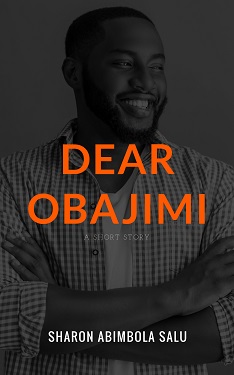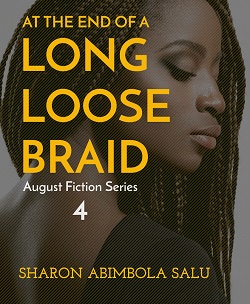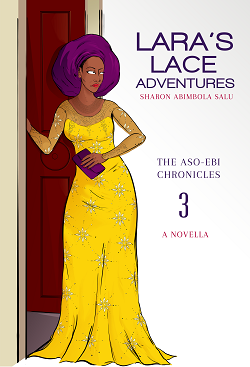I hope you had an awesome weekend! This episode of The Day I Will Never Forget brings together Father Christmas, Miss Agbo and an English Composition. What does one have to do with the other? Well, you’ll have to read to find out. 🙂
Here’s Episode 7.
Enjoy!
Episode 7: Father Christmas, Miss Agbo and That English Composition
One week to our final exams, Miss Agbo came to class with an air of importance, and made the following announcement:
“Children, the composition you will write for your final exams is ‘The Day I Will Never Forget.’ ”
To make things interesting, she added a caveat: not only would this homework account for 10% of our final grade, but also, whoever scored the highest would get a special present hand-delivered by Father Christmas.
To give the bearded big guy a head start, she made each student write his or her special Christmas request on a piece of paper, and drop it in a small, self-constructed cardboard box with a single slit at the top. After marking our scripts, she would open that box and Father Christmas would give the lucky child a special gift.
Miss Agbo had given us a challenge, and I expected to come out on top.
So, I got busy.
On my own piece of paper, I scribbled the name of a particular toy I had been eyeing for a while, and which my parents had refused to buy for me, probably due to budgetary constraints.
Their refusal was certainly not due to any deficit in the bank of their affection for me.
If my parents would not oblige me, maybe Father Christmas would have mercy and grant my request.
But first, I had to conquer that composition.
Unlike the first time Miss Agbo had hinted at this assignment weeks before, I had a different dilemma. I was not at a loss for what to write.
No.
My problem was what to exclude.
In the months that had passed, so much had happened in my own little world that I had difficulty narrowing my composition down to a single story.
Full of worry that afternoon, I took my dilemma to Nnamdi, who as my older brother, I expected would have written a composition on this topic when he had been in my class.
But Nnamdi proved to be totally unhelpful.
“Why did your teacher give you that topic?” he asked. “My own teacher just said we should write on ‘Necessity is the Mother of Invention,’ and I wrote about how people had to make cars to get from place to place.”
As disappointed as I was with Nnamdi’s answer, it eventually inured to my benefit because I was forced to go and seek my father’s counsel on this very special assignment.
You see, while my mother helped us with typical everyday homework, my father was the connoisseur of special projects in our home. He took charge of helping me and Nnamdi whenever our teacher gave us these assignments.
So, he was not at all surprised when I approached him with my composition homework.
“Okay, when is it due?” he asked, glancing at the calendar hanging on the wall beside the television.
“This Friday, sir.”
“Good. That gives us enough time to come up with a good idea.”
“But, Daddy, I have final exams this week.”
“That won’t stop us. We’ll get it done.”
My father’s repeated use of “us” gladdened my heart. It meant that even though I had no intention of sharing the prize I was eyeing with my father, I was less apprehensive about this assignment.
But when I remembered that this assignment had been given by Miss Agbo, a woman who was not easily outwitted, the old fear returned.
What if she saw the hand of my father in this assignment that I was supposed to do all by myself, and decided to give me a big, fat zero, complete with eyes and ears, and a wicked smile?
I relayed my fears to my father.
“Ezekiel, don’t worry about that,” he said soothingly. “Nothing will surprise your teacher. She already knows that parents will definitely help their children with this particular homework. You know why?”
I shook my head.
“Because there’s a prize to be won. It’s as much the parents’ competition as it is the children’s competition. So don’t worry, you hear? Relax. We’ll do this together.”
But I was still not convinced. I didn’t believe my father’s explanation. If it was true, then why did Miss Agbo not say so in plain terms? Why did grown-ups always complicate simple things like this?
No, I needed more convincing, and stood rooted to the same spot like a statue.
My father divined my distrust. But that was not all. My face must have also betrayed the depth of my skepticism because before I could say another word, he had burst into laughter.
“Chioma! C-h-i-o-m-a! Come and see your son o! He thinks his old man is lying. See his … He-he-he … See his face!” said my father, roaring with laughter.
My mother emerged from the kitchen where she had been putting finishing touches to our dinner. Wiping the sweat from her brow with the corner of her wrapper, she asked me, “What is it?” even though it was my father who had summoned her.
My father took over and answered her.
“His teacher gave him homework and it’s due on Friday,” he began.
“This Friday?” she asked, pointing to the floor with the forefingers of both hands, “Or next Friday?” she said, pointing to a distant point beyond my father’s head, which was clearly where the other Friday was hiding.
“This Friday,” he confirmed. “I said I will help him, and he says he’s worried his teacher will know I helped him and give him zero.”
“Ahn ahn, how can?” my mother asked frowning.
“That’s what I told him o. I said his teacher expects parents to help their children, and it won’t surprise her. After I told him … well, you can see his face,” said my father pointing towards my face with an open palm.
My mother chuckled, and said:
“Ezekiel, your father is right. If your teacher wanted you to do it by yourself, she would have made it a pop quiz or test in class.”
After my mother had expressed her own view, which was in complete alignment with my father’s, I was finally convinced and let go of my fears.
My father told me to give him 24 hours to come up with ideas for the composition, and he encouraged me to do the same.
The following evening, he called me and the first word he uttered baffled me.
Collage.
What on earth was that? I wondered.
“Ezekiel, we’re going to do a collage. A collage of stories,” he said, as if repeating the foreign term twice in a row would somehow cause it to explain itself to me. If that was his expectation, it did not come to pass because his actions only deepened my confusion.
My face must have portrayed my lack of understanding of the word “collage.” So, my father took it upon himself to enlighten me.
“Okay, Ezekiel. Remember that art project I did with Nnamdi?”
“Which one, Daddy?” I asked.
An apt question because my father had helped Nnamdi with several art projects, especially in the past year. That was mostly the fault of his over-ambitious art teacher at the time, Mr. Lawal, who was probably eyeing the “Teacher of the Year” award. Somewhere in his mind, over-burdening students with art projects was irrefutable proof of a teacher’s efficiency.
But it appeared that he was the only one in the school who shared that opinion.
Even my mother commented and said:
“This your art teacher sef … His own is too much! If you don’t turn to Picasso before Christmas, we will go and collect your school fees from the Headmaster! Ahn ahn! Over-sabi!”
Eventually, Mr. Lawal was replaced by Mr. Adelaja, who had less grandiose ideas, and was content to stick with the syllabus.
My father, thankfully, went on to describe the particular art project he was referring to.
“You remember that time when you followed your mummy and Nnamdi to the market to buy buttons and sequins?” he asked.
I scrunched up my nose as if it would aid my memory. It did not work, but I certainly remembered buying buttons from the market. I also remembered the scraps of cloth we picked up from the tailor.
But what on earth were sequins? A type of fish?
“Sequins? Daddy, I don’t kn–”
“Shine-shine! That’s what I’m talking about!”
“Oh yes, Daddy! Now, I remember. Nnamdi used glue to glue all of those things … and even newspapers too, to a poster.”
“It was actually a cardboard sheet, Ezekiel,” said my father, correcting me, “and remember the shape of the drawing? It was a lion. Do you remember?”
“Yes, Daddy. You used the buttons for the eyes and the shine-shine for the hair, the cloth for the body, and the newspapers–”
“–For the tail,” said my father nodding and smiling. “That is what we’ll do with your homework. We’ll use different stories, different experiences, mix them together the way your mother turns garri and hot water when she’s making eba, and work them into a single story.”
“Okay, Daddy,” I said giggling at the eba reference, “but you’re going to help me?”
“Of course. We’ll do it together. Oya, go and bring paper. Let’s start.”
We sat together at the dining table, and after going back and forth, settled on five stories to work with. The composition was limited to 500 words, so that restricted the amount of rambling we could manage, but we eventually made it work. After listening to feedback from my mother and Nnamdi, we spent two more nights revising the composition. After we had polished it to my father’s satisfaction, I submitted it to Miss Agbo that Friday.
That entire week was finals week, so I had to study and take final exams side by side with my preparations for the composition. But because the composition was in lieu of an English final exam, I had one less subject to study for. At least, I didn’t need to study and prepare for it the way I had to for the other subjects.
The week after our final exams was very laid back, relaxed and homework-free. Because it was the last week of classes, teachers kept us busy doing the kind of work they did not have to grade such as reading, while they diligently worked at grading our final exams and projects and assembled our report cards.
The end-of-term Christmas party was scheduled for Friday of the final week of school, after which we would all go home for the holidays.
No school till January.
Pure bliss!
Our excitement was only toned down by the fear of what the results of the final exams would be, and what our report cards would eventually say. It was the difference between a Merry Christmas, and a Christmas where dissatisfied and disappointed parents constantly asked their children, “Why didn’t you take first position? Does that boy or girl who came first have two heads?”
Rhetorical questions, of course, but repeating them over Christmas was sure to ruin the holidays for the unfortunate child.
On Wednesday afternoon, while Miss Agbo was grading the final exams and starting work on some report cards, she got an urgent message from Mr. Aderinto, the Headmaster. He sent a student to call her to come to his office immediately.
Before leaving the classroom, Miss Agbo told us to read the books we had each borrowed from the school library that morning. I had picked up a copy of “Sugar Girl,” by Kola Onadipe, while Bright was devouring a copy of “The Passport of Mallam Illia,” the classic novel by Cyprian Ekwensi.
I had seen another classmate engrossed in “The Drummer Boy,” another book by Cyprian Ekwensi, and made a mental note to borrow that from the library the following day.
Miss Agbo was gone for about thirty minutes. During that time, the naughtier kids came to the front of the classroom, pretending to be the teacher. They took turns using her long wooden ruler to point at the blank blackboard, while commanding us to repeat certain words our teacher usually said, such as:
“The past tense of ‘Go’ is ‘Went.’ Say it after me!”
“The plural of ‘Goose’ is ‘Geese.’ You there, get up and tell us, what is the plural of ‘Danfo?’ ”
Neither of the twins was present this time. They had toned down their mischievousness after Miss Agbo punished them the other day.
However, for the Young and Restless ones in front of the class, there was no dissuading them from being naughty. Not even Bright’s threats to include their names on the list of noisemakers, one of his many duties as Class Captain, could sway them otherwise. They knew that as we were about to go home for the holidays, there was a limit to the amount of punishment any teacher could give that week. They took to chanting:
“Holiday is coming!”
Annoyingly, they all settled back down in their seats just before Miss Agbo returned to the classroom. She had a little smile on her face when she came back, but we had no way of knowing what had been discussed at the Headmaster’s office.
Not yet.
Thursday flew by, and then Friday came. It was a bright and cheerful day.
All the students arrived in school that day wearing festive outfits or as we called them, “party clothes.” It was a uniform-less day. Gone were the drab, blue uniforms we were forced to wear week after week, and instead, we were dressed in a kaleidoscope of colors. The girls had ribbons and colorful clips in their hair, and the boys looked like they had fresh haircuts.
I wore the same outfit I had worn on my birthday because it was my best and favorite outfit. But there was an important difference: my haircut.
My father had taken me to a sane barber who had given me a handsome Mike Tyson haircut that would have made that famous boxer proud to have the haircut named in his honor.
The school was providing lunch for us, and already at the end of morning assembly, we saw large trucks in the school yard, loaded with crates of Coca-Cola, Fanta and similar drinks. Some men loaded the bottles into large drums packed with ice, well ahead of the 12 noon lunchtime when we would sit down to the school-sponsored feast.
When we got to class, Miss Agbo announced that Father Christmas was here, and we would all be going to see him.
So, we walked in a single file to the music room, which just like the rest of the school was adorned with shiny red and green Christmas decorations. In a corner of the room which was visible as soon as we stepped inside, was a large well-decorated green Christmas tree wrapped with multicolored Christmas lights flickering on and off.
“I wanna wish you a Merry Christmas ….”
That was the sound that greeted our ears as we got closer to the music room, and it was coming from a Boney M cassette tape playing on a radio close to the Christmas tree. To the left of the splendid tree, sat a man in the typical Father Christmas attire: red and white suit, matching hat, and black boots.
The obligatory over-sized belly was present, though the way it slouched to one side suggested that it was filled with cotton wool and not hot eba. On the ground near his feet, was a large, red made-from-Velvet bag spilling with presents.
But there was something odd about Father Christmas, and it wasn’t the lopsided snow white mustache and beard which looked like it had been hastily thrown on.
No, it was the other thing on his face: a pair of black sunglasses.
We were left wondering if Father Christmas had been struck with temporary blindness from staring too hard at Christmas lights 365 days in a year, or if he was fast asleep and simply wanted to hide this from us.
As we got closer, Option 2 evaporated into thin air, unless sleepwalking was the alternative explanation, because the man leapt to his feet, placed both hands on his belly and in a deep, pretentious voice bellowed:
“Ho! Ho! Ho! Merry Christmas! Who wants to sit on Father Christmas’ lap?”
A few children stepped back in fear, while I heard a few boys plot on how they would unmask the man by pulling his beard and making away with his glasses.
Either they were just blowing hot air or they changed their minds later due to the appearance of Mr. Pepper in Miss Agbo’s hand. She brandished it like a sword in their direction, and then held it up to her lips.
Without saying a word, they, and the rest of us, understood what she meant.
Keep quiet!
A hush fell on the entire room, and then we each walked up to Father Christmas, who had assumed a sitting position.
One by one, we sat on his laps, whispering impossible and implausible requests into his ears. His reaction to each child was the same: he would laugh that fake, throat-deep laugh that did not come from his belly, and say “M-e-r-r-y Christmas!” before handing over a party pack of items similar to the one my mother had crafted for my own birthday.
I was one of the last children to visit Father Christmas simply because of my position on the line. The more agile students had leapt into place when Miss Agbo told us to form a line, and before I could blink, I found myself close to the tail end of the line.
But eventually, my turn came, and I stepped forward eagerly for my annual visit to Father Christmas.
As far as we knew, it was Mr. Adelaja under that suit. I did not doubt it for a moment, until I sat on the laps of this man and looked into his face.
Yes, he was wearing a pair of sunshades, and yes, most of his face was covered with a white beard and mustache.
But the artificial facial hair only covered the periphery of his face, leaving his cheeks exposed.
Both cheeks were bare, and that was where everything started to unravel.
Mr. Adelaja, as we all knew, had one distinguishing feature on his face.
Make that two.
He had two vertical, hard-to-miss, blackened tribal marks seared into his cheeks, one on each side of his face. Some students had given him the nickname, Mr. Imulaja, owing to the fact that it was his nose that separated the tribal marks from each other, and in their minds, kept them from fighting each other.
It did not help either, that Mr. Imulaja had a prominent nose, which suggested that he inhaled three times the amount of oxygen than normal men did.
Of course, they only called him “Imulaja” behind his back.
So, you can imagine my shock when as I sat on Father Christmas’ laps, I observed that the extra-large nose was absent and the tribal marks were missing.
What could have happened?
Had Mr. Adelaja’s nose shrunk overnight? Had someone succeeded in wiping off the tribal marks he had borne since infancy from his face?
No, no! I was convinced that this was an impostor.
But who could this be, posing as Father Christmas?
As soon as I got off his laps, present in hand, I waited for Bright to complete his visit with the impostor, and then when he joined me where I stood waiting for the last child to visit Father Christmas, I told him what I had seen.
Bright, as you know, was a sharp guy, and had noticed it too. It was he who suggested our next line of action.
“You know Father Christmas still has to come to our class to give the prize to the winner of that English composition. So when he comes to class ehn, as he is leaving, we will–”
And he whispered the rest of his plan to me. It sounded like a solid plan to me and I communicated my agreement with a vigorous nod.
After the last student hopped off Father’s Christmas’ lap, Miss Agbo made us thank him with one voice, and then we returned back to our classroom in a single file.
When we had settled down, she brought the cardboard box containing our special requests to Father Christmas, and pulling at the slit on top, Miss Agbo tore a hole through the flimsy cardboard paper with her bare hands.
Such savagery!
What happened to using a pair of scissors?
Then, she emptied the pieces of paper on the table.
After searching through, amidst her complaints that some students had failed to write their names alongside their requests, she pulled out one single piece of paper.
It bore the name of the student who had scored the highest in that composition she had assigned to us earlier.
Until then, it had been a mystery.
Not anymore.
First, she cleared her throat, and then she announced:
“Class, please give a warm round of applause to the student who scored the highest in the composition titled, “The Day I Will Never Forget,” Timiebi Tova! Timi, come forward and collect your prize, please!”
Amid thunderous applause, Timiebi, the quietest boy in the class walked from his seat at the back of the class to the front where the teacher stood. It was obvious from the look on his face and on our faces too, that no one had foreseen his victory.
It was truly a surprise.
Although I was disappointed that I had not won, I was pleased that it was Timi who had won because he had shared his food with me more than once when I left my lunch at home.
As soon as Timi joined Miss Agbo in front of the class, she gave him a warm handshake and congratulated him. Turning to the door, she called out in a loud voice:
“Father Christmas, show yourself!”
In marched the big-bellied poser in the red uniform, still repeating the script he had been given:
“Ho! Ho! Ho! Merry Christmas!”
This time around, he was holding a single item in his hand: a black and white spotted, professional quality soccer ball for the victor. Timi’s eyes lit up as soon as he saw the football, and so did the other children in the class who gazed at it in envy.
How did Miss Agbo know before dismantling the box that Timi had asked for a real football? She must have removed those pieces of paper beforehand, looked at them and somehow put them back into the box without damaging it.
Or maybe this was a different box?
Perhaps, we would never know.
Just then, Bright nudged me, and said in a loud whisper:
“Now!”
That was the sign he had given me to swing into action and execute our plan.
But as I stood there looking at Father Christmas, I suddenly became even more aware of how much taller and stronger than me he was, and the foolishness of our plan became obvious. How could we have thought we could trip Father Christmas and unmask him while he was groveling on the ground?
Impossible.
But we had not devised a Plan B.
Bright and I froze where we stood as we watched Father Christmas wish us all a Merry Christmas one last time before heading towards the door.
Just before he reached the door, Miss Agbo told him to wait for her.
Then, she left instructions with us to open our presents and inspect them before she came back.
It was now almost time for lunch.
As soon as she left in the company of Father Christmas, all the students began to talk at once saying different things. That was when it hit me that if I did not find out who Father Christmas was that day, I would never know for the rest of my life.
How could I let that happen?
So, I left Bright, and crept out after Father Christmas and Miss Agbo.
I followed them as they made their way back towards the music room. They were talking and laughing and I wondered what Miss Agbo could possibly have to say to Father Christmas and vice-versa.
When they got close to the music room, they stopped suddenly.
Then, Father Christmas looked around carefully.
After satisfying himself that they were not being watched, he pulled Miss Agbo close to him. I heard a giggle escape from her mouth, and with one swift movement, she pulled off the man’s cap. From where I crouched hidden behind a hedge, I observed that this person had a full head of hair unlike the balding Mr. Adelaja.
But that was not all.
Father Christmas pulled off his sunglasses, and held them in one hand.
That was when I saw his face, the face of the person in the Father Christmas costume.
Uncle Henry!
How could I have missed it?
But why was Uncle Henry posing as Father Christmas?
Before I had time to digest the unmasking of the man in the red suit, another scene unfolded before my very eyes.
Uncle Henry who was now so close to Miss Agbo that the tips of their noses touched, turned his head slightly sideways.
His hands slid to her waist.
And then, they did what those actors and actresses did in movies, just before my parents would shout to me and Nnamdi, “Close your eyes!”
They kissed.
This time, I didn’t close my eyes. They were wide open, and even though I was not dreaming, I still couldn’t believe my eyes.
Father Christmas was kissing my class teacher.
… to be continued …
<<READ EPISODE 8>>
*Image Credit: Pinterest










Thanks Sharon! Your stories are always a delight. 🙂
Debbie: My pleasure! I’m glad you find them delightful. 🙂
Thanks for stopping by!
Hey Sharon,
Hahahahahahahah!!!! I knew it! k.i.s.s.i.n.g 😀
This was the best episode yet! You really outdid yourself.
So many things made me laugh, I literally crumpled in a chuckle-y heap reading this.
This cracked me up majorly – “Unlike the first time Miss Agbo had hinted at this assignment weeks before, I had a different dilemma. I was not at a loss for what to write.” XD
“Imulaja” lol
Indeed, sequins are “shine-shine”, that’s what we called it till we knew better.
“what is the plural of ‘Danfo?” Ah! Sharon, I cant explain how much I admire your imaginative mind. I was transported into Ezekiel’s classroom.
Well done, and thank you for sharing this delightful episode.
Oya, I hope episode 8 is coming soon?
Enjoy the rest of the week.
Nedoux: Yes, you were right … but I didn’t want to ruin the surprise. Hehe! Thank you so much for the kind words. One never knows how each episode will play out, so I’m glad it made you laugh and do back flips (that’s my interpretation … LOL!)
Even now that we know better, somewhere in our minds, it’s still “shine-shine!” 😀
Plural of Danfo? I have no idea. I was expecting Ezekiel to look up from “Sugar Girl” and answer. No such luck. 🙁
I actually prefer Imulaja to Adelaja. Not sure he appreciates it though. 🙂
Episode 8 is on the way. Fear not! Have an awesome rest-of-the-week too!
You’ve done a great job so far on the series, Sharon. I was a little disappointed that Ezekiel didn’t win the prize, considering his father’s concept for the essay. I hope there was mistletoe hanging above the kissing lovers?
Abiona: Been a while! Thanks for the kind words too. 🙂
I’m glad you raised the issue with Ezekiel not winning the prize because that is partly what I will address in the next episode. Hopefully, you’ll see the reasoning behind it and forgive Miss Agbo. 😀
As for mistletoe, emmm … I cannot categorically say … Lol! Maybe there was ugwu hanging sef, I don’t even know. Those two didn’t seem to care. Hehe!
Thanks for stopping by and commenting! 🙂
PS: the plural of Danfo is Danfos.
Abiona: Aha! Mystery solved! Hehe! Thanks o. 😀